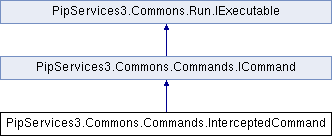Implements a ICommand command wrapped by an interceptor. It allows to build command call chains.The interceptor can alter execution and delegate calls to a next command, which can be intercepted or concrete. More...

Public Member Functions | |
| InterceptedCommand (ICommandInterceptor interceptor, ICommand next) | |
| Creates a new InterceptedCommand, which serves as a link in an execution chain.Contains information about the interceptor that is being used and the next command in the chain. More... | |
| Task< object > | ExecuteAsync (string correlationId, Parameters args) |
| Executes the next command in the execution chain using the given Parameters parameters(arguments). More... | |
| IList< ValidationResult > | Validate (Parameters args) |
| Validates the Parameters args that are to be passed to the command that is next in the execution chain. More... | |
Public Attributes | |
| Schema | Schema => _next?.Schema |
| Gets the command schema. More... | |
Properties | |
| string | Name [get] |
| Gets the command name. More... | |
 Properties inherited from PipServices3.Commons.Commands.ICommand Properties inherited from PipServices3.Commons.Commands.ICommand | |
| string | Name [get] |
| Gets the command name. More... | |
| Schema | Schema [get] |
| Gets the command schema. More... | |
Private Attributes | |
| readonly ICommandInterceptor | _interceptor |
| readonly ICommand | _next |
Detailed Description
Implements a ICommand command wrapped by an interceptor. It allows to build command call chains.The interceptor can alter execution and delegate calls to a next command, which can be intercepted or concrete.
Constructor & Destructor Documentation
◆ InterceptedCommand()
| PipServices3.Commons.Commands.InterceptedCommand.InterceptedCommand | ( | ICommandInterceptor | interceptor, |
| ICommand | next | ||
| ) |
Creates a new InterceptedCommand, which serves as a link in an execution chain.Contains information about the interceptor that is being used and the next command in the chain.
- Parameters
-
interceptor the interceptor that is intercepting the command. next Next intercepter or command in the chain.
Member Function Documentation
◆ ExecuteAsync()
| Task<object> PipServices3.Commons.Commands.InterceptedCommand.ExecuteAsync | ( | string | correlationId, |
| Parameters | args | ||
| ) |
Executes the next command in the execution chain using the given Parameters parameters(arguments).
- Parameters
-
correlationId unique transaction id to trace calls across components. args the parameters (arguments) to pass to the command for execution.
- Returns
- Execution result.
See Parameters
Implements PipServices3.Commons.Run.IExecutable.
◆ Validate()
| IList<ValidationResult> PipServices3.Commons.Commands.InterceptedCommand.Validate | ( | Parameters | args | ) |
Validates the Parameters args that are to be passed to the command that is next in the execution chain.
- Parameters
-
args the parameters (arguments) to validate for the next command.
- Returns
- A list of errors or an empty list if validation was successful.
See Parameters, ValidationResult
Implements PipServices3.Commons.Commands.ICommand.
Member Data Documentation
◆ Schema
Gets the command schema.
Property Documentation
◆ Name
|
get |
Gets the command name.
- Returns
- the name of the command that is being intercepted.
The documentation for this class was generated from the following file:
- src/Commands/InterceptedCommand.cs
 1.8.13
1.8.13